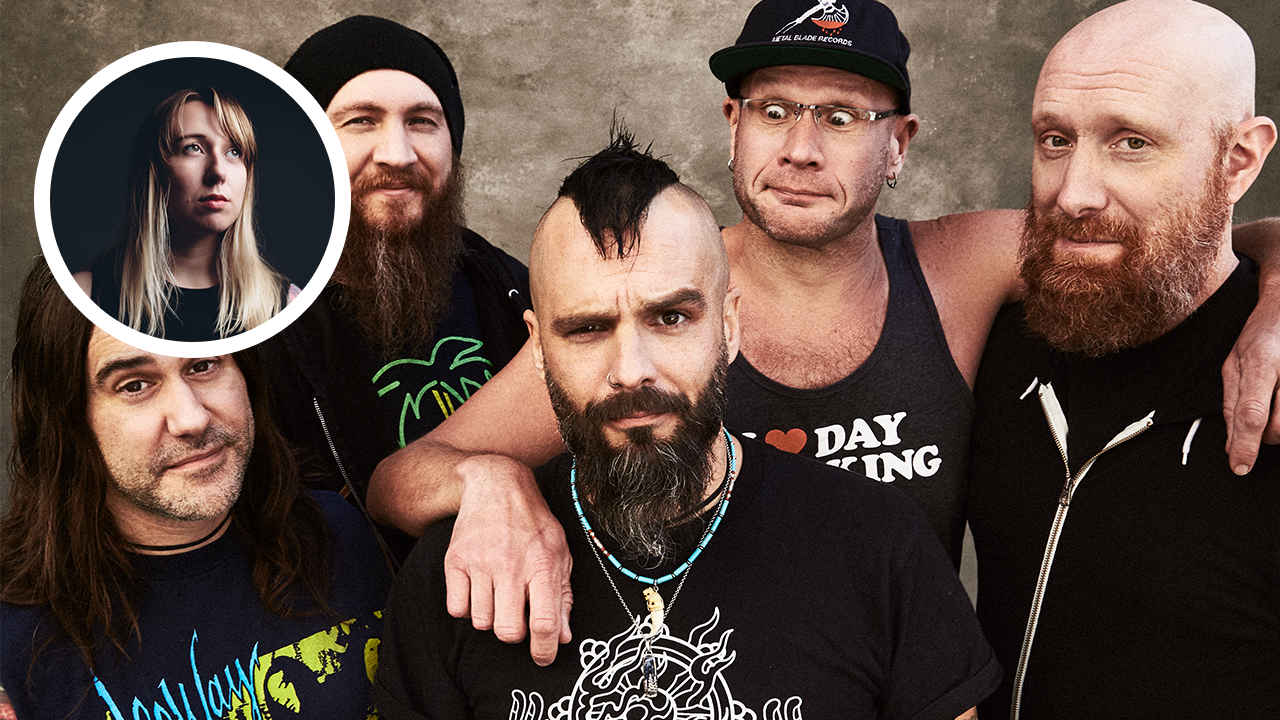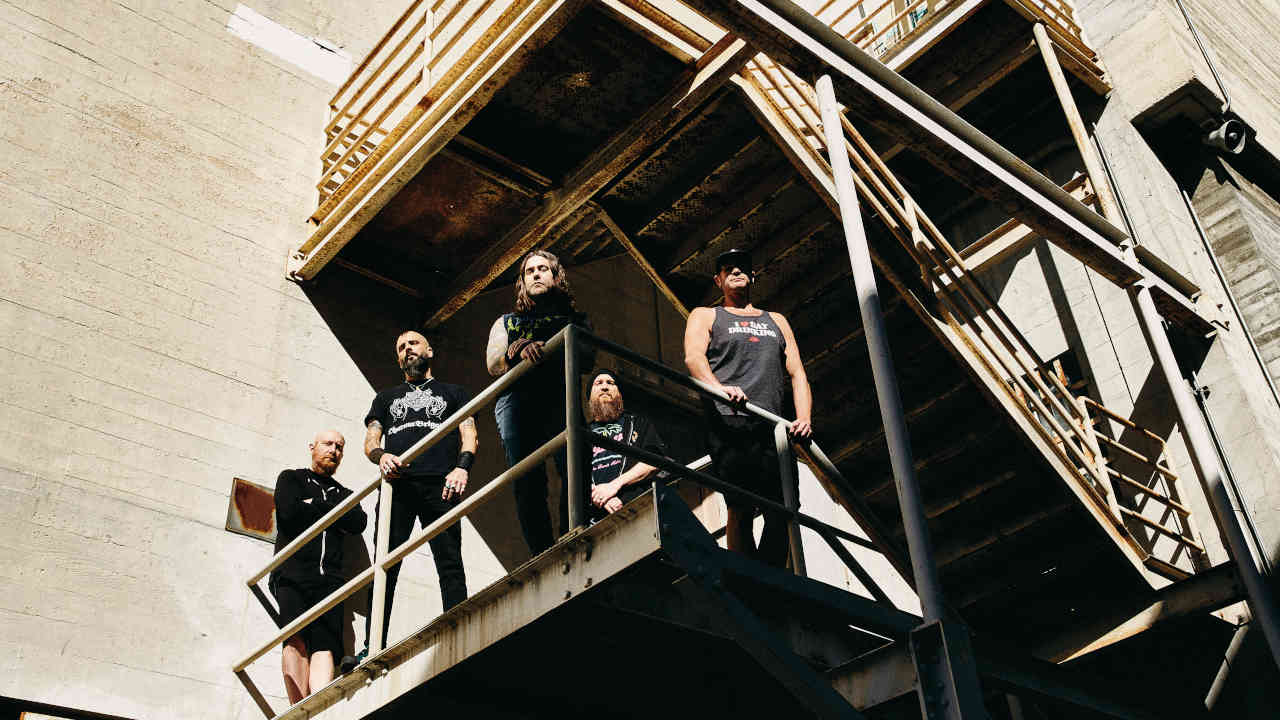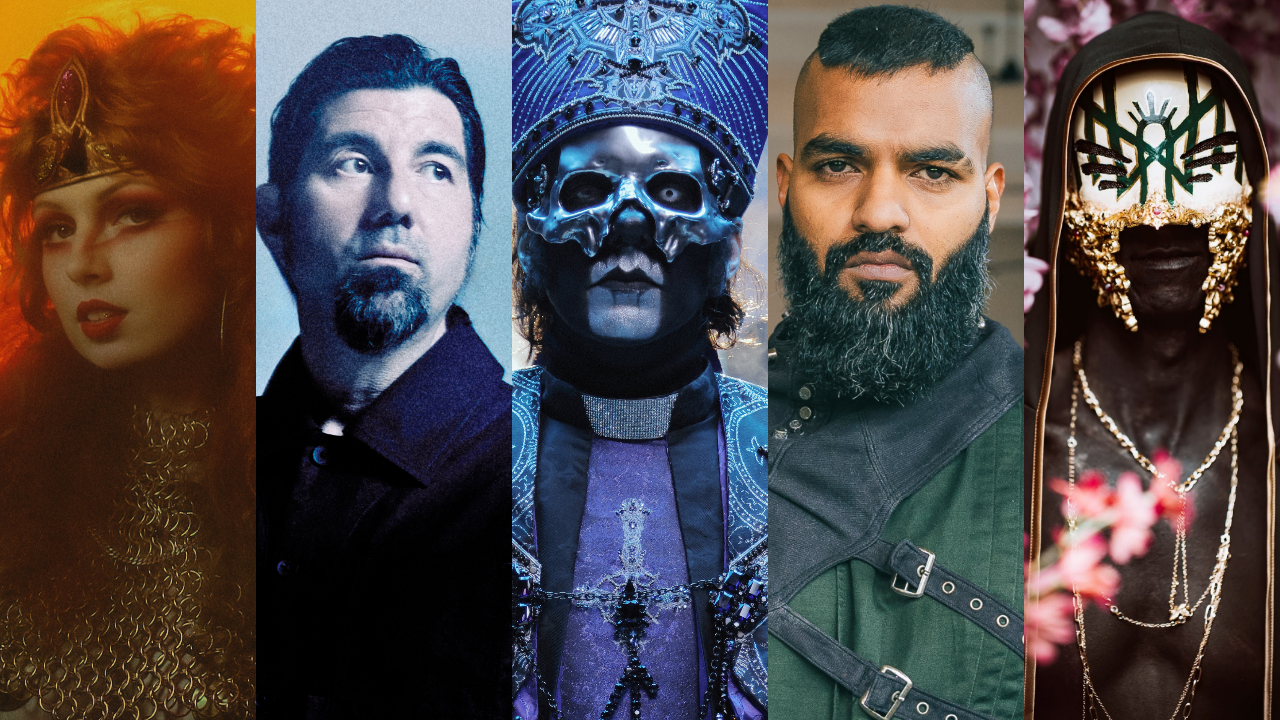Killswitch Engage: “Nu metal? I dislike anything where the guitar player only uses one string”
We put Killswitch Engage’s Adam D and Jesse Leach in a room with Employed To Serve’s Justine Jones and a tape recorder. This is what happened

Two decades ago, if you’d said ‘metalcore’ to someone, chances are they wouldn’t have had the faintest idea what you were talking about. As nu metal ruled the mainstream, this little-known cross-section of hardcore punk and classic thrash was only the concern of a small collection of hardened, underground fans, fighting for attention against Linkin Park, Limp Bizkit and the rest. It didn’t stand a chance. Right? Then Killswitch Engage happened.
The quintet became so successful that metalcore is now one of the most dominant genres. Without them, we might not have had Parkway Drive, or Architects, or Spiritbox, or While She Sleeps, or Bury Tomorrow, or… you get the picture. That’s why, when we decided to chronicle their thrilling journey from underground punks to metalcore royalty, including the Howard Jones era (2002-2012) and beyond, we needed someone who knew their shit.
Justine Jones, lead larynx with the UK’s own Employed To Serve – another band that’s benefited from KSE’s boundary busting – was delighted to jump in and grill two of her heroes, vocalist Jesse Leach and guitarist Adam Dutkiewicz, about how they evolved into one of the most important bands in metal’s history.

Justine: “What was the scene like in Westfield, Massachusetts when you guys kicked off in 1999?”
Adam: “It was really supportive, with bands like us and Shadows Fall kinda just helping each out. It was pretty incestuous as well; Jon [Donais] from Shadows Fall and I were in a band together before either of our bands formed, [Killswitch bassist] Mike D was from Overcast, which of course had Brian [Fair] from Shadows Fall in as well. It was nice, like a little family.”
Jesse: “For me, Western Mass was a little more metal, and where I lived in Providence, Rhode Island was a lot more hardcore. So, that kind of blend of styles would really influence what would go on to happen, the crazy street hardcore and the Western Mass blend of more melodic, European metal was really crucial in what would go on to happen.”
Justine: “Who were your main musical influences?”
Sign up below to get the latest from Metal Hammer, plus exclusive special offers, direct to your inbox!
Jesse: “From Agnostic Front to Slapshot, Cro-Mags to Integrity, but I was also really into death metal, so Grave, Suffocation, Obituary and Edge Of Sanity. To this day I still say they were the forefathers of mixing melodic vocals with growling. On that note, Paradise Lost, Opeth, a lot of the European bands – they had a huge impact on the US hardcore scene I believe.”
Adam: “I was a hardcore kid for sure, so that was a huge influence on everything I do. But, like Jesse says, this was around the time the European metal thing was coming along, the likes of In Flames, Napalm Death, At The Gates, Carcass. All of that went into the melting pot for us.”
Justine: “Adam, what was your first impression of Jesse?”
Adam: “Just an emotional little man! Ha ha ha!”
Jesse: “Not much has changed!”
Adam: “I remember that his clean vocals had this amazing quality to them that was really appealing. I felt like that was a whole new twist that he could bring to the band if he were to sing for us. We tried out a lot of people, but he really stood out; an emotional little man with this amazing voice.”
Jesse: “Yeah, lyrics were always really important to me, I was a poet first. I always try to bring that into whatever I’m doing. I guess ‘emotional little man’ is pretty accurate.”
Adam: “Better than being a large, cynical fuck!”
Jesse: “No, I thought Adam was super-cool, because he was just so different from anybody. He had that punk rock, fuck you, I don’t care what you think, kind of attitude. He was a monster onstage, but then when he got offstage, he was this really friendly, cool, matter-of-fact kinda dude.”
Justine: “When you guys released Alive Or Just Breathing [in 2002] it was promoted with a casket filled with all the nu metal fashion from the time. You were out to kill nu metal!”
Adam: “We weren’t out to kill anything; it was just a piece of shameless promotion from our label. It was funny I guess.”
Jesse: “Yeah, I mean, I get it, you want a hook to get people excited about a new band, and we were definitely doing something different from what was going on at that time, but… that kind of bravado is not our style.”
Justine: “What did you guys think of nu metal?”
Adam: “I dislike anything where the guitar player has six strings but they only use one.”
Jesse: “I can take or leave some of it, but I really love Deftones, what they were doing was incredible, you can’t deny some of the riffs of Korn, but some of that stuff was a little goofy. I definitely hated on it at the time, but in retrospect I actually prefer it to some stuff I hear now. It was a commercial sound, and we were into the underground, so it was a little hokey.”
Justine: “My Last Serenade was such a huge song for you guys. How did that song come about?”
Jesse: “For me, lyrically, I was in my bedroom feeling some heartache. I wanted it to sound like a song about burning bridges, but a more philosophical take on it, but it ended up sounding like a relationship song. It was actually a much deeper thing than just a relationship with somebody.
In a lot of ways, it is the song that inspired me to write lyrics with dual meanings. It was a lightbulb moment, and I remember talking to Adam about it and we both thought there was something there. I had that melody part, but Adam helped me push it in the right direction, and once we nailed that I knew we had something special.”
Adam: “I wrote that whole song, but I remember Joel [Stroetzel, guitar] coming up with the bridge.”
Jesse: “Really? I didn’t know that. I love that riff, it has this kinda Bad Brains stomp to it, so I was all about that.”
Justine: “Did you have any idea it was going to end up being this huge song for you guys?”
Jesse: “I never thought we’d be playing it 20 years later, no.”
Adam: “I have zero confidence in anything we do! Ha ha ha!”
Jesse: “I’ll say this though, I thought it was different. I thought the melody really pushing against the heaviness was a way I really wanted us to go.”
Justine: “How did you guys feel about being part of The New Wave Of American Heavy Metal? You guys, Trivium and Lamb Of God just swept through our school at that time, and it felt like you came in this really cool package together.”
Adam: “It’s cool. Whatever you gotta label us, I don’t mind.”
Jesse: “We have a lot of friends that have done a lot of cool stuff. I mean, the fact that we’re here all these years down the line tells me it was something special.”
Justine: “Did you ever imagine metalcore would be the type of music that big labels wanted to sign and that ended up on radio and TV?”
Adam: “Oh god, no! I had a day job and I thought, ‘Ah fuck it, I guess I’ll give this a shot for a year, it probably won’t work out, but I’ll feel bad if I don’t give it a shot.’ And here we are.”
Jesse: “It still blows my mind that I get to do this for a living. I remember seeing Slipknot on late-night TV and hearing them on the radio and thinking it was the first time I’d ever heard screaming in that environment. It felt like the tides had changed, it was incredible, but if you had ever told me I was going to be part of that I’d have laughed in your face.”

Justine: “How hard was it for you when you left the band [in 2002], Jesse?”
Jesse: “I’m surprised I survived it. I was in a really dark place for many years. That was not knowing who I was as a human, and not knowing how to present myself, being mentally ill but not having the words for it. I needed that growth. Me going away was the best thing that could’ve happened to me because I went through the struggles I needed to go through.”
Adam: “Emotional little man! I was just pissed he quit via email, like a break-up text! We were coming back from tour and the van broke down, he flew back and we got the shitty email. Come on, bro! I was a little upset at him about that, but I could see how much he was struggling at being in this band. His frustration with his voice not working was… look, it’s not supposed to be like that. You shouldn’t be filled with worry every day, he didn’t have a grasp on how to use his voice, and if he had remained in the band that constant struggle would have destroyed us.”
Justine: “When did it occur to you that Howard Jones would be a good fit to front the band?”
Adam: “When he first tried out! Ha ha ha! We immediately thought, ‘This dude has some serious pipes. We should probably give him the job.’ I’ll never forget the overwhelming feeling of playing the first show with him. We were still something of an underground band back then, and we played Hellfest in front of a lot of scene kids and people who knew Howard from his previous bands, and we immediately felt the support from everyone there. It was amazing.”
Justine: “When The End Of Heartache came out [in 2004] Killswitch were huge, and there were a lot of metalcore bands forming and doing well in the scene in the aftermath of that. Did you see your influence in them?”
Adam: “Nope. Not really. People always say we’ve influenced so many bands, but each band has their own identity, I don’t think anyone has ever tried to rip us off.”
Jesse: “I have a different perspective. I was only half paying attention to the scene because after I left Killswitch I got more into doom and stoner rock, but those younger bands felt derivative to me. The good ones found their sound over time, but there was an over-saturation of bands who were churning out this big riff, heavy verse, melodic chorus thing. It felt tired, like labels were looking for those bands because they sounded like a band who were becoming successful.”
Justine: “That happens in every scene, doesn’t it – the good ones find a way to stay relevant.”
Jesse: “Sure, and look at a band like Architects – they came up around that time and they’ve turned into an incredible band. The ones that had nothing else have been forgotten. It’s the difference between starting a band because you’re passionate and starting one because you wanna look cool and get chicks.”
Justine: “Jesse, what were those years out of the band like?”
Jesse: “I did the grind for about four or five years. I dipped my toes in and out of music, and that means you have this whole new appreciation for it. No matter how tired I get on tour I always think, ‘At least I’m not clocking in and out like I used to.’ It’s given me extra impetus to never go back to that.”
Justine: “How did the conversations for having Jesse back in the band first come about?”
Adam: “Well, we had kept in touch, and I had just done the first Times Of Grace album with Jesse [2011’s The Hymn Of A Broken Man]. When our management told me he might want to come back, it felt like it could be a good idea. I mean, we knew he could do the early material! Ha ha!”
Jesse: “Yeah, at first I was hoping you’d split up so we could do another Times Of Grace album! Ha ha! But, I’d been working in this bar and I just thought, ‘Why am I giving up on this thing?’ So I contacted their management and said I wanted to audition. It took a lot of guts for them to take me back because I was up against some heavy hitters.”
Justine: “Jesse, coming back into the band, how much has it changed, and have you changed, from the first time around?”
Jesse: “Well, I’ve changed a lot from the guy I was five years ago I think, so to go all that way back, it’s changed completely. I had to learn my instrument and use my voice, and that really helped my mental state. I was like the wet-behind-the-ears kid all excited on the tour bus, but I think that rubbed off on the guys and it made those first couple of tours back really exciting. I’ll never forget that moment at Download in 2012, stepping onstage and seeing the crowd go up and around the hill beyond the horizon, and the clouds opening up and the sun hitting my face. I’ve had some incredibly emotional moments since I’ve been back, but that one stands out.”
Justine: “Getting Howard back for The Signal Fire feels like everything coming full circle. How did that all come about?”
Adam: “I think it was just to show everyone there was no beef, everyone might not get along at one point, but you go through these things and, at the end of the day, we all love each other. We love Howard and want him to be a part of it.”
Jesse: “For me, it’s closure, and I’ve really got to know him. He was in a band called Driven when I was 16 or 17 years old, and my band would play with them. I always admired him, because of this big, bellowing voice, but I never knew him until I got back in this band. Once I learned about him, about his struggle, what he goes through every day [Howard left KSE in 2012 to concentrate on managing his Type 2 diabetes], I felt a lot of solidarity with him, plus I sing a lot of his songs. To take the idea of what I thought he was, and to find out
who he actually is and marry the two was mind-blowing.
So, when the idea came up, I wanted to write this song about solidarity, it was just very organic.”
Adam: “It shows such humility from Jesse. There are always so many ego-driven problems with lead singers in bands, I can’t think of another band that have done what we’re doing, letting the old vocalist come up and sing some songs. We just want to do the right thing for our fans.”
Justine: “Do you ever think about your legacy?”
Adam: “Fuck, no!”
Jesse: “If you’re going to focus on your legacy and what you think people think your place in music should be, you’re doing it wrong.”
Adam: “Why hold onto your accomplishments when you can strive to do something new?”
Published in Metal Hammer #361. Killswitch Engage’s new album Live At The Palladium is out on June 3.
